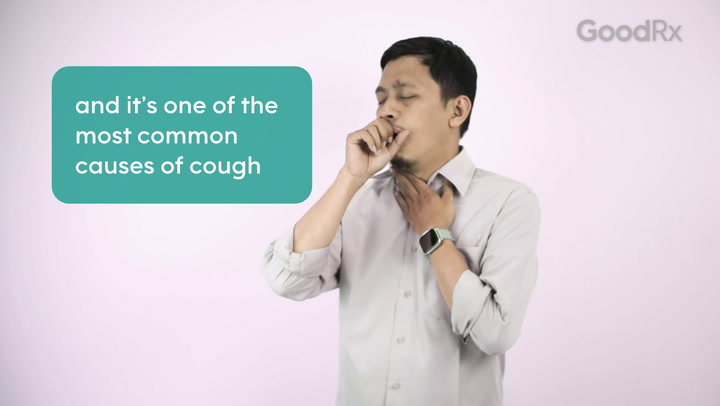
The 9 Most Common Causes of a Persistent Cough — and How to Get Rid of It
Key takeaways:
A persistent dry cough is common after having an upper respiratory infection like a cold or the flu. It will typically go away on its own.
A dry cough that lingers may have an underlying cause that requires additional treatment.
If you have a persistent cough that lasts longer than 8 weeks or is accompanied by fever, shortness of breath, or chest pain, see a healthcare professional immediately.
Access savings on related medications
Table of contents

Are you coughing a lot but don’t feel sick? You’re not alone. Persistent cough is one of the most common reasons that people visit their doctor’s office. But it’s not always a cause for concern. After all, a cough is a natural reflex by the body to help clear the airway, and it can be protective. It usually goes away on its own, but sometimes a cough can last a few weeks after an infection like a cold or the flu.
It can be hard to know what to do about a lingering cough that won’t go away. Here, we’ll cover some possible causes for your cough, what you can do about it, and when to get professional help.
What is a persistent cough?
It’s common to have a cough that lasts up to 3 weeks after an upper respiratory infection has resolved.

But a persistent cough is one that has been around for more than 3 weeks.
A persistent dry cough is one where you aren’t coughing up much mucus. This will sometimes go away on its own.
But if you have a persistent productive cough (meaning you’re coughing up mucus), you should see your primary care provider — even if you’ve recently had been treated for an upper respiratory infection. You may still have a more serious infection (like pneumonia) that requires more treatment.
Over-the-counter cough remedies: Explore top tips to get rid of wet and dry coughs without needing a prescription.
Does honey really help a cough? Honey is a simple remedy for a nagging cough. You can take it by the spoonful or in a hot drink to soothe and coat your throat.
Should you see your doctor for your cough? Most coughs resolve on their own. But sometimes they can be a sign of a serious health condition, like pneumonia or heart problems. Learn when to get checked out for a cough.
How much can your cough tell you about what’s wrong with you? Quite a lot. The sound of your cough, its timing, and what you’re coughing up can give you useful clues about what type of illness you may have.
What are the most common causes of a persistent cough?
There are many reasons for a lingering cough, most of which aren’t too serious. The good news is, with proper evaluation of your cough, you can usually treat it quickly.
Here are the most common reasons you might have a persistent cough.
1. Reactive airways after an upper respiratory infection
Sometimes your airways can become inflamed after an upper respiratory infection. This can make your airways sensitive and hyperreactive, making you cough.
It’s not clear why this happens. It may be due to the nerves in your airways, or the airways themselves becoming more sensitive. Or it may be caused by the body’s increased mucus production.
In most cases of reactive airways, X-rays and test results are normal. This type of persistent cough will usually resolve on its own. But taking medication to reduce cough, inflammation, and mucus may be helpful for relieving symptoms.
2. Postnasal drip
Postnasal drip, or upper airway cough syndrome, can occur anytime the nose or sinuses become irritated or inflamed. This leads to mucus draining down the throat and triggering a cough.
There are many causes of postnasal drip, including colds, sinus infections, and allergies, like hay fever. The result may be a dry cough or it may be associated with some mucus.
Signs that postnasal drip may be the cause of your persistent cough include:
The sensation of liquid dripping down the back of your throat
Always having to clear your throat
Nighttime cough
Hoarse voice
Nasal discharge
Postnasal drip may improve on its own. Or you may need treatment with antihistamines, steroid nasal sprays, or other over-the-counter (OTC) nasal sprays. In some cases, prescription medication may be useful.
3. Asthma with cough
Asthma normally includes symptoms, such as wheezing, difficulty breathing, and chest pain. But sometimes the only symptom is coughing. In this case, the cough is typically worse at night.
Asthma-related coughing may follow an upper respiratory infection and worsen if you’re exposed to cold temperatures or certain allergens, like dust or fumes. It can also be triggered by laughing or exercise.
An asthma cough won’t get better with OTC medication. It’s usually treated with prescription inhalers, which help control the cough. In cases in which this type of asthma goes untreated, up to 40% of adults go on to develop further symptoms of asthma.
If you have a cough with no other symptoms, you may want to visit your primary care provider to get checked for asthma.
Quiz: Could I have asthma?
4. Acid reflux and gastroesophageal reflux disease
Acid reflux and gastroesophageal reflux disease (GERD) are other possible causes of persistent dry cough.
It’s still unclear why GERD might make you cough, but experts think it’s related to something called aspiration. This is when food or acid from the stomach comes up to the throat and enters the airways. Coughing happens as a reflex to help prevent the food and acid from entering your lungs. More research is needed to understand this relationship.
For some people, a cough from acid reflux will be accompanied by the typical symptoms of heartburn or a sour taste in the mouth. But up to 75% of people have no GERD symptoms at all.
It’s often worth trying a GERD medication for 2 to 8 weeks to see if the dry cough goes away.
GERD medications are proton pump inhibitors (PPIs). They work by reducing the amount of acid in the stomach. Here are some common examples of PPIs:
Lansoprazole (Prevacid)
Pantoprazole (Protonix)
Omeprazole (Prilosec)
Esomeprazole (Nexium)
Other recommendations may include sleeping with your head elevated and not eating within 3 hours of bedtime.
5. Medication side effects
Sometimes the medications you take can cause a persistent dry cough. A classic example of this is cough caused by a class of medication called angiotensin-converting enzyme (ACE) inhibitors. These medications are commonly prescribed for people who have high blood pressure, heart disease, and diabetes. But ACE inhibitor-induced cough is reported in up to 20% of people who take them.
Popular ACE inhibitors include:
Lisinopril (Zestril)
Benazepril (Lotensin)
Enalapril (Vasotec)
Other medications may also cause a persistent cough. The most common include:
Sitagliptin (used to help control blood sugar in people with diabetes)
Calcium channel blockers (used to manage high blood pressure)
Nitrates (most often used to treat chest pain)
Latanoprost (eye drops used to treat glaucoma)
If you think medication might be the reason for your cough, talk with your prescriber. They can help you stop or switch medications safely — if needed. The good news is, if medication is causing your cough, the cough usually goes away within a few weeks after you stop taking the medication.
6. Lower respiratory infection
Lower respiratory infections are a common cause of chronic cough. These include infections like:
Bronchiolitis
These infections are typically caused by viruses but may be caused by bacteria as well.
Clues you may have a lower respiratory infection include symptoms like:
Fever
Shortness of breath
Decreased appetite
If you have any of these symptoms with your cough, you need to let your medical care team know. You may need a chest X-ray to look for changes in the lung that require further treatment.
7. Smoking
Smoking tobacco or cannabis can cause a persistent cough. This is because the toxins released when smoking are irritants to the airways. These toxins can damage the lining of the lungs and cause symptoms of bronchitis, like cough and excess mucus.
The “smoker’s cough” is typically a cough with mucus that’s worse in the morning. But, it can improve once you stop smoking. You could notice a decrease in your coughing in the first month after you quit smoking.
8. Chronic obstructive pulmonary disease
Chronic obstructive pulmonary disease (COPD) is a condition that’s commonly associated with chronic cough. In fact, cough is one of the most reported symptoms of COPD.
COPD is usually caused by repeated exposure to irritants of the lungs and airway. The most common reason for this is smoking.
Symptoms of COPD include:
Productive cough
Wheezing
Shortness of breath
Fatigue
If you have a history of smoking and a chronic cough, you may need further testing to figure out the cause of your symptoms.
9. Allergies
About 1 in 4 U.S. adults get seasonal allergies. In addition to itchy, watery eyes and a runny nose, seasonal allergies commonly cause a persistent cough. If your cough is caused by seasonal allergies, it will go away on its own once whatever is causing your allergy goes away.
So if you’re allergic to pollen, for example, your cough will get better once the seasons change and there’s less pollen in the air. In the meantime, you can take allergy medicine to help relieve your symptoms.
Persistent cough treatment
To treat a persistent cough, focus on addressing the cause, for example, allergies, asthma, and acid reflux. If you’re unsure, you could try natural treatments or OTC medications. Remedies you might try for a nagging cough include:
Cough suppressant to quiet cough (like Robitussin)
Expectorant to thin mucus (like Guaifenesin)
Humidifier (to loosen mucus)
Honey (to decrease mucus secretions)
Lozenge (to decrease cough and throat irritation)
If you don’t see any improvement within 1 to 2 weeks, or if your symptoms are worsening, it may be time to get professional help. You should always get medical attention if you have a cough that won’t go away.
Why am I coughing so much but not sick?
We usually think of a cough as a sign of being sick, like having a runny nose or having a fever. But the truth is that a cough doesn’t always mean that you’re sick. You can have a cough for a lot of reasons, from acid reflux to allergies.
If you’ve ever had a coughing fit while eating a meal, you know that something as simple as swallowing wrong can cause lots of coughing in an otherwise healthy person. Coughing is just a reflex our bodies developed to protect our breathing tubes from things that don’t belong in them, like dust or food. You can be completely healthy, but if your cough reflex is triggered, it can cause you to cough.
When should you be concerned about a persistent cough?
Even though a cough usually isn’t anything to worry about, it’s always possible there could be a more serious cause. If you have a persistent cough accompanied by any of the following symptoms, you should see a medical health professional right away:
Fever
Night sweats
Shortness of breath (difficulty breathing)
Chest pain
Weakness
Vomiting
Weight loss
Frequently asked questions
A dry cough at night is often a sign of postnasal drip. Postnasal drip is when mucus from your nose or sinuses drains into your throat. This causes inflammation that makes you cough. Because lying flat causes more mucus to drip into your throat, a postnasal drip will make you cough more at night.
And there are lots of other reasons why your cough may seem worse at night: Your body’s circadian rhythm can send your immune system into overdrive overnight, and increase your stress hormones. And, you’re less distracted at night, too, so the cough feels worse.
If your cough gets worse when you lie down and better when you sit up, it could be a sign of acid reflux or gastroesophageal reflux disease (GERD).
Coughing from acid reflux happens when acid from your stomach goes up your esophagus where it doesn’t belong. You have a muscle called the lower esophageal sphincter that’s supposed to help prevent this from happening. But this muscle naturally relaxes when you sit up (and tightens when you sleep), so sitting up can make people with acid reflux cough.
If your cough is due to an infection, one sign of improvement is when it goes from a wet cough to a dry cough. This is because a wet cough usually means that the infection is still active in your body. A dry cough, on the other hand, is caused by airway inflammation, which can happen even after the infection is gone. Other signs of your cough improving are when your cough becomes less frequent and less strong.
There are lots of reasons why talking can trigger a cough. Acid reflux, asthma, and problems with your larynx (voicebox) are all reasons why your cough might be triggered by talking. If you experience coughing while talking, speak with your primary care provider to find out why this might be happening to you.
Coughing is a protective reflex. Like all reflexes, some people have stronger reflexes, while other people have weaker reflexes. In people with a strong cough reflex, taking a deep breath alone can be enough to trigger that reflex and cause a cough. If inhaling causes you to cough, it could just be that you have a sensitive cough reflex.
The bottom line
A dry, persistent cough can be bothersome and disruptive to your daily life. But it normally isn’t anything to worry about and it will usually go away on its own.
If you have a cough that lasts longer than 2 weeks, or a cough along with other symptoms like fever, shortness of breath, or blood in your mucus, you need to see a healthcare professional. They will help you determine what might be causing the cough and recommend treatment options for you.
Why trust our experts?



References
American Academy of Allergy, Asthma & Immunology. (2018). Chronic cough: The larynx might be the problem. The Journal of Allergy and Clinical Immunology: In Practice.
American Cancer Society. (2020). Health benefits of quitting smoking over time.
American College of Gastroenterology. (n.d.). Acid reflux.
American Lung Society. (n.d.). Chronic cough.
Braman, S. S. (2006). Postinfectious cough: ACCP evidence-based clinical practice guidelines. Chest.
Burgel, P. R. (2013). Chronic cough in chronic obstructive pulmonary disease: Time for listening? American Journal of Respiratory and Critical Care Medicine.
Durrazo, M., et al. (2020). Extra-esophageal presentation of gastroesophageal reflux disease: 2020 Update. Journal of Clinical Medicine.
Finley, C. R., et al. (2018). What are the most common conditions in primary care? Canadian Family Physician.
Francis, D. (2016). Chronic cough and gastroesophageal reflux disease. Gastroenterology and Hepatology.
Goldsobel, A., et al. (2010). Cough in the pediatric population. Journal of Pediatrics.
Koskela, H., et al. (2021). Deep inspiration-provoked cough: A sign of cough reflex arc hypersensitivity. Lung.
Lucanska, M., et al. (2020). Upper airway cough syndrome in pathogenesis of chronic cough. Physiological Research.
Lv, H., et al. (2015). Refractory chronic cough due to gastroesophageal reflux: Definition, mechanism and management. World Journal of Methodology.
Mandanick, R. D. (2013). Management of GERD-related chronic cough. Gastroenterology & Hepatology.
National Heart, Lung, and Blood Institute. (2024). What is asthma?
Ng, A. E., et al. (2023). Diagnosed allergic conditions in adults: United States, 2021. Centers for Disease Control and Prevention.
Niimi, A. (2011). Cough and asthma. Current Respiratory Medicine Reviews.
Poulose, V., et al. (2016). Approaching chronic cough. Singapore Medical Journal.
Públio Pereira, A. N., et al. (2016). Angiotensin-converting enzyme inhibitor-induced cough prevalence in refractory hypertensive patients. Journal of Hypertension and Management.
Shapiro, J., et al. (2004). What to do with the patient with chronic cough? A simple approach to a difficult problem. The Permanente Journal.
Shim, J. S., et al. (2020). Drug-induced cough. Physiological Research.
Undem, B. J., et al. (2015). Neural dysfunction following respiratory viral infection as a cause of chronic cough hypersensitivity. Pulmonary Pharmacology & Therapeutics.

























